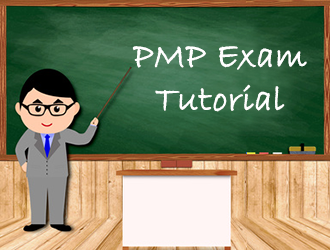
Unlike most of the project management knowledge areas, which deal with a specific area of expertise of the project manager, the Project Integration Management knowledge area is something of a catch-all, containing many of the everyday actions of a project manager. It is the glue that holds the project together.
The processes within the Project Integration Management knowledge area are:
- Develop Project Charter
- Develop Project Management Plan
- Direct and Manage Project Work
- Manage Project Knowledge
- Monitor and Control Project Work
- Perform Integrated Change Control
- Close Project or Phase
Develop Project Charter
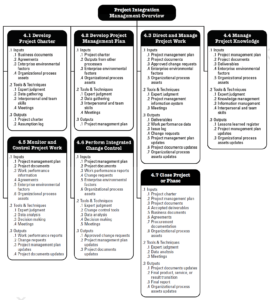
The project charter is the incorporation document of the project. In some ways, it is “above” the project. It defines what the organization is thinking when creating the project. It lays out the goals of the project as well as the business case for it, and authorizes the project manager. A Statement of Work identifies the project’s scope, although a complete scope statement is not the goal at this stage. That falls to the project scope knowledge area.
Inputs
- Business documents
- Business Case
- Benefits management plan
- Agreements
- Enterprise environmental factors
- Organizational process assets
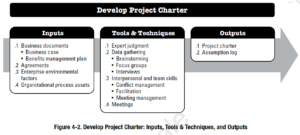
Tools & Techniques
- Expert judgment
- Data gathering
- Brainstorming
- Focus groups
- Interviews
- Interpersonal and team skills
- Conflict management
- Facilitation
- Meeting management
- Meetings
Outputs
- Project charter
- Assumption log
Develop Project Management Plan
The project management plan defines the how the project will be managed. It can be distributed to the stakeholders or kept as a private document which guides the project manager. All ten knowledge areas are covered in it, and more than half of the PMBOK’s processes are used in its creation. It is a living document that is updated as the project progresses, for example the project’s scope changes, schedules are adjusted, budgets are revised, and so forth.
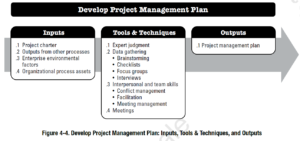 Inputs
Inputs
- Project charter
- Outputs from other processes
- Enterprise environmental factors
- Organizational process assets
Tools & Techniques
- Expert judgment
- Data gathering
- Brainstorming
- Checklists
- Focus groups
- Interviews
- Interpersonal and team skills
- Conflict management
- Facilitation
- Meeting management
- Meetings
Outputs
- Project management plan
Direct and Manage Project Work
Managing the day to day work of the project falls under this process – Things like responding to questions, directing the project team, holding status meetings, and so forth.
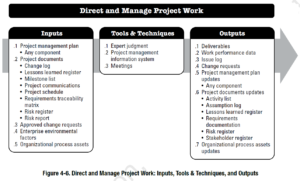 Inputs
Inputs
- Project management plan
- Any component
- Project documents
- Change log
- Lessons learned register
- Milestone list
- Project communications
- Project schedule
- Requirements traceability matrix
- Risk register
- Risk report
- Approved change requests
- Enterprise environmental factors
- Organizational process assets
Tools & Techniques
- Expert judgment
- Project management information system
- Meetings
Outputs
- Deliverables
- Work performance data
- Change requests
- Project management plan updates
- Any component
- Project documents updates
- Activity list
- Assumption log
- Lessons learned register
- Requirements documentation
- Risk register
- Stakeholder register
- Organizational process assets updates
Manage Project Knowledge
All projects utilize a knowledge subset to produce the required deliverables. The project inherits a knowledge bank from its project team or organizational unit. Any further knowledge must be acquired throughout the project. And finally, the project must transfer the new knowledge back into the organization for use in future endeavors.
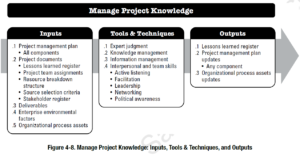 Inputs
Inputs
- Project management plan
- All components
- Project documents
- Lessons learned register
- Project team assignments
- Resource breakdown structure
- Source selection criteria
- Stakeholder register
- Deliverables
- Enterprise environmental factors
- Organizational process assets
Tools & Techniques
- Expert judgment
- Knowledge management
- Information management
- Interpersonal and team skills
- Active listening
- Facilitation
- Leadership
- Networking
- Political awareness
Outputs
- Lessons learned register
- Project management plan updates
- Any component
- Organizational process assets updates
Monitor and Control Project Work
Effective project control is foundational to good project management. Creating a good project management plan that sits on the shelf is meaningless. The project work must be monitored and controlled to ensure that it adheres to the project management plan. Earned value analysis is performed by the project manager at regular intervals to ascertain the project’s budget and schedule status. Measuring the project’s status is often a significant exercise – how do you measure it, who will measure it, and how often. This may seem like alot of “non-chargeable” work, but when there is confidence in the earned value data, decisive action can be taken in the early stages of a variance to get the project back on track.
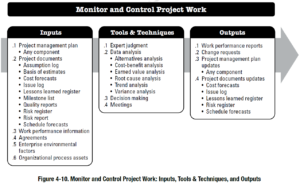 Inputs
Inputs
- Project management plan
- Any component
- Project documents
- Assumption log
- Basis of estimates
- Cost forecasts
- Issue log
- Lessons learned register
- Milestone list
- Quality reports
- Risk register
- Risk report
- Schedule forecasts
- Work performance information
- Agreements
- Enterprise environmental factors
- Organizational process assets
Tools & Techniques
- Expert judgment
- Data analysis
- Alternatives analysis
- Cost-benefit analysis
- Earned value analysis
- Root cause analysis
- Trend analysis
- Variance analysis
- Decision making
- Meetings
Outputs
- Work performance reports
- Change requests
- Project management plan updates
- Any component
- Project documents updates
- Cost forecasts
- Issue log
- Lessons learned register
- Risk register
- Schedule forecasts
Perform Integrated Change Control
There’s nothing that creates more stress than project changes. If the project needs more money, more time, more people, or more of anything to accomplish the same end result, there is certain to be ramifications. Project changes need to be meticulously processed, or the dreaded “scope creep” bug might crawl in and make itself at home. Any project change needs to be identified and the changes to the project’s cost, schedule, quality, or any other factor must be documented and communicated with the appropriate stakeholders.
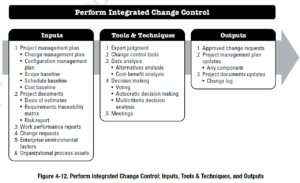
Inputs
- Project management plan
- Change management plan
- Configuration management plan
- Scope baseline
- Schedule baseline
- Cost baseline
- Project documents
- Basis of estimates
- Requirements traceability matrix
- Risk report
- Work performance reports
- Change requests
- Enterprise environmental factors
- Organizational process assets
Tools & Techniques
- Expert judgment
- Change control tools
- Data analysis
- Alternatives analysis
- Cost-benefit analysis
- Decision making
- Voting
- Autocratic decision making
- Multicriteria decision analysis
- Meetings
Outputs
- Approved change requests
- Project management plan updates
- Any component
- Project documents updates
- Change log
Close Project or Phase
There are almost always a myriad of things that must be done to close a project or phase. Things like final inspections, insurance or bonding documentation, or contract closures. Closing a project is one of the most skipped yet greatest visibility aspects of the project to senior managers and executives.
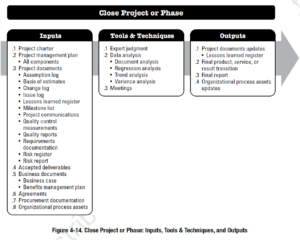 Inputs
Inputs
- Project charter
- Project management plan
- All components
- Project documents
- Assumption log
- Basis of estimates
- Change log
- Issue log
- Lessons learned register
- Milestone list
- Project communications
- Quality control measurements
- Quality reports
- Requirements documentation
- Risk register
- Risk report
- Accepted deliverables
- Business documents
- Business case
- Benefits management plan
- Agreements
- Procurement documentation
- Organizational process assets
Tools & Techniques
- Expert judgment
- Data analysis
- Document analysis
- Regression analysis
- Trend analysis
- Variance analysis
- Meetings
Outputs
- Project documents updates
- Lessons learned register
- Final product, service, or result transition
- Final report
- Organizational process assets updates
Tutorial Navigation
- Next Page: Project Scope Management
- Home: PMP Exam Tutorial




